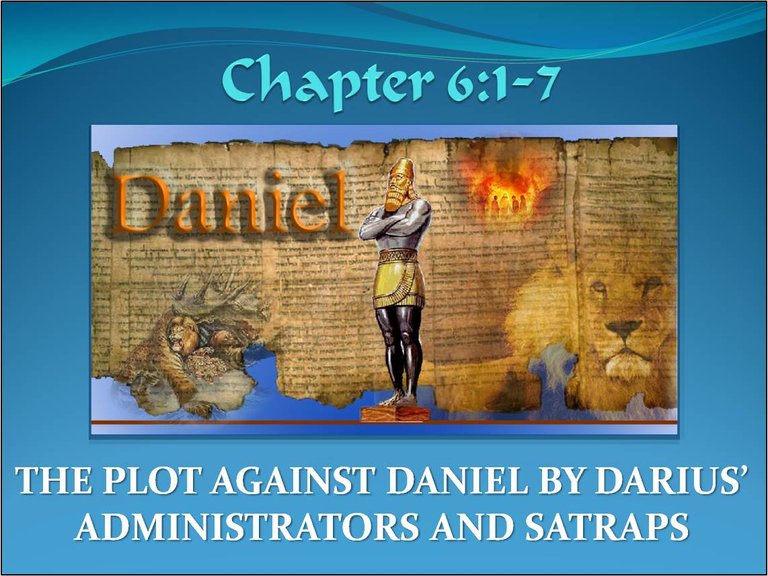
It pleased Darius to appoint 120 satraps to rule throughout the kingdom, with three administrators over them, one of whom was Daniel. The satraps were made accountable to them so that the king might not suffer loss. Daniel 6:1-2
DANIEL APPOINTED AS AN ADMINISTRATOR OVER THE PERSIAN EMPIRE
In 607 B.C., Daniel was among the captives taken during the first Babylonian invasion of Jerusalem. He became a chief minister at Nebuchadnezzar's royal court. Daniel was known as a man who could interpret dreams and visions. Daniel was summoned by Nebuchadnezzar’s grandson, King Belshazzar to interpret the handwriting on the wall. Daniel pronounced judgment on Belshazzar telling him that his kingdom was divided and given to the Medes and Persians.
The Achaemenid Empire, also called the First Persian Empire, was an empire based in Western Asia. It was founded by Cyrus the Great after he united the Medes and the Persians. The Medo-Persians invaded Babylonia from the east in June of 539 B.C. and captured its capital, Babylon. Cyrus the Great (also Cyrus II or Cyrus the Elder) reigned over Persia between 559 –529 B.C.
The Persian Empire was noted for embracing various civilizations and becoming the largest empire of ancient history, spanning at its maximum extent from the Balkans and Eastern Europe in the west, to the Indus Valley in the east.
A satrap was a provincial governor appointed by the king of Persia. Darius the Mede, also known as Darius the Great, ruled Persia from 522–486 B.C. He completed the organization of the empire into satrapies, initiated by his predecessor Cyrus the Great. King Darius fixed the annual tribute due from each province. He also organized a new uniform monetary system, along with making Aramaic the official language of the empire.
Including Daniel, Darius appointed three administrators to oversee the 120 provincial governors that he had appointed.
DANIEL WAS BEYOND REPROACH
Now Daniel so distinguished himself among the administrators and the satraps by his exceptional qualities that the king planned to set him over the whole kingdom. At this, the administrators and the satraps tried to find grounds for charges against Daniel in his conduct of government affairs, but they were unable to do so. They could find no corruption in him, because he was trustworthy and neither corrupt nor negligent. Finally these men said, “We will never find any basis for charges against this man Daniel unless it has something to do with the law of his God.” Daniel 6:3-5
Daniel was taken captive to Babylon in 607 B.C. Forty-eight years later in 539 B.C., Babylon was conquered by the Medes and the Persians. For nearly half a century, Daniel had faithfully served his captors. His exceptional and trustworthy character was beyond reproach. King Darius was planning to place Daniel in the position of prime minister over all the empire to root out waste and corruption. The other administrators and the satraps were so concerned about having an honest man in a position of power and authority over them that they sought to discredit Daniel.
Realizing that they could not bring charges of misconduct against Daniel because he was a diligent worker and a man of integrity; the other government officials sought to make it illegal for Daniel to follow his religious practices.
THE SCHEME TO ENTRAP DANIEL
So these administrators and satraps went as a group to the king and said: “May King Darius live forever! The royal administrators, prefects, satraps, advisers and governors have all agreed that the king should issue an edict and enforce the decree that anyone who prays to any god or human being during the next thirty days, except to you, Your Majesty, shall be thrown into the lions’ den. Daniel 6:6-7
The political leadership of Darius’ kingdom devised a scheme to entrap Daniel. They knew that Daniel was faithful to the God of Israel. Even as a young captive in Babylon, Daniel refused to defile himself with unclean food from Nebuchadnezzar’s table.
Using flattery, these administrators and satraps sought to persuade Darius into issuing a royal decree forbidding anyone to petition any god or man except the king for the following thirty days. The penalty for disobeying this edict would be a horrible death – being mauled and devoured by lions. The intent of these greedy officials was to ensure that Daniel would not live to oversee their corrupt practices.

Congratulations @lastdays! You received a personal award!
Click here to view your Board
Congratulations @lastdays! You received a personal award!
You can view your badges on your Steem Board and compare to others on the Steem Ranking
Vote for @Steemitboard as a witness to get one more award and increased upvotes!